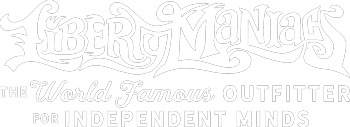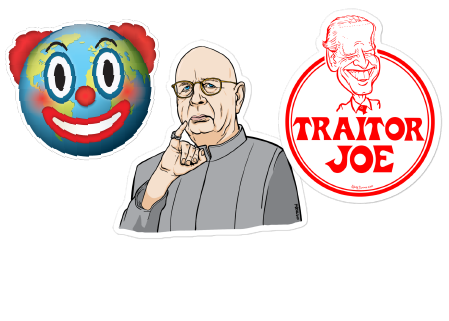Every piece I’ve bought has held up, looks great, and is actually comfortable to wear—can’t say that about a lot of brands. I’m hooked. Nothing else I’ve found comes close.
Why Some People Just Can’t Move On After Trump’s 2024 Victory

Alternate versions for other audiences: Original Version and The Quick Read Edition
When Donald Trump won the 2024 election, a lot of people, especially on the “woke left,” reacted with intense anger and disbelief. For them, this wasn’t just about politics—it felt like their whole worldview was under attack. Why did they react so strongly? It has to do with something called ideological capture. This happens when people get so committed to a belief system that they can’t see beyond it. Here, we’ll explain what ideological capture is, why it’s hard to break free from it, and what this means for everyone else.
What is Ideological Capture?
Ideological capture is when people become so wrapped up in a set of beliefs that it controls how they see everything. Imagine wearing glasses that only let you see one color. Even if things are different colors, all you’d see is that one color through the glasses. For people who are ideologically captured, everything they see and experience gets interpreted through the “lens” of their beliefs.
People caught in this mindset have a hard time seeing things from other perspectives. To them, their ideology—their set of beliefs—is the only “right” way to think. Anyone who doesn’t agree with them isn’t just wrong; they’re seen as dangerous or even evil.
A Look Back: The Cultural Revolution
A similar thing happened during the Cultural Revolution in China (1966-1976). At that time, China’s leader, Mao Zedong, tried to make everyone follow extreme communist beliefs. Teachers, writers, and other people who usually encouraged questioning and learning were forced to become “enforcers” of the ideology.
Books were burned, cultural traditions were erased, and people were punished for not following the “official” ideas. In his book The Cultural Revolution at the Margins, Yiching Wu explains, “Ideological purity became a demand. Those who questioned or deviated, even slightly, were marked as reactionary elements.” In other words, if you didn’t agree, you were seen as an enemy. People were afraid to think differently, which meant that critical thinking disappeared.
This created a climate where trust broke down, and people turned against each other. This period shows how ideological capture can make a society unhealthy by forcing everyone to think the same way.
America’s Own Version: Schools, Media, and Social Media
Today, a similar thing is happening in the U.S., especially in certain groups and institutions. For example, many schools, media outlets, and social media platforms push a “woke” ideology—a set of beliefs that focuses heavily on social justice, identity, and equality. And while these ideas are valuable, the pressure to conform can make it hard for people to express different opinions.
In schools, students and teachers might feel pressured to agree with certain ideas or face social consequences. In media, journalists who are supposed to question and investigate are often expected to stick to the same viewpoint. Social media also makes things worse, since algorithms only show people content that aligns with their beliefs, creating a “bubble” where it feels like everyone thinks the same way.
Why It’s So Hard to Break Free
Escaping ideological capture is very challenging, and here’s why:
1. Cognitive Dissonance
Cognitive dissonance is a term psychologists use to describe the uncomfortable feeling people get when something doesn’t match what they believe. When people with strong beliefs see evidence that challenges those beliefs, it creates mental discomfort. Instead of rethinking things, they often choose to ignore the evidence or find a way to explain it away.
Imagine spending years believing you’re on the “right side” of history, fighting for something important. Then, imagine finding out that maybe some of those beliefs aren’t entirely accurate. The mental discomfort of realizing this can be so uncomfortable that people avoid it by clinging even harder to their beliefs.
2. Social Reinforcement
Ideological capture is reinforced when people are surrounded by others who believe the same things. This is called social reinforcement. It’s like being part of a club where everyone agrees on certain rules and ideas. Questioning the beliefs might mean losing social acceptance, so it’s easier to just go along.
Social media makes this even stronger. Algorithms show people content that matches their beliefs, creating a “feedback loop” where everyone they see online agrees with them. This makes it seem like the belief is universally true, and anyone who disagrees is in the wrong.
3. Identity Fusion
Identity fusion is when a person’s beliefs become a core part of who they are. When people are ideologically captured, their beliefs feel inseparable from their identity. This is especially true for people whose jobs or social lives are tied to their beliefs. For example, if a professor has built a career teaching woke ideas, changing those beliefs might mean losing not just their job but their sense of self.
In some academic fields, there’s even a hierarchy based on identity and “intersectionality” (the idea that various aspects of identity like race, gender, etc., combine to create different levels of privilege or disadvantage). For someone who’s deeply invested in this system, questioning it isn’t just a disagreement; it feels like a personal crisis.
4. Information Control
In today’s world, social media and news platforms have a lot of control over the information people see. This is known as informational encapsulation—a fancy term for the idea that people are “trapped” in the information they’re allowed to see. For people who are ideologically captured, this can make it feel like there’s only one true viewpoint.
For example, algorithms on platforms like Facebook and Twitter filter out content that doesn’t match a person’s beliefs. This reinforces ideological capture because people aren’t exposed to other perspectives. Without hearing alternative ideas, they believe their ideology is the only correct one.
5. Psychological Dependence
For many people, ideology fills a need for purpose and meaning. Psychologists call this existential security—a feeling of stability that comes from having a clear sense of right and wrong. When people believe they’re fighting for justice, it gives them a strong sense of purpose and makes them feel like their actions matter.
If a person’s whole purpose is wrapped up in an ideology, questioning it can feel like losing their sense of meaning. This psychological dependence on ideology makes it very hard for people to question their beliefs without feeling completely lost.
What’s Next?
Because of these factors, most people who are deeply committed to woke ideology aren’t likely to change their views soon. Here are some things we might see in the future:
-
Increased Division: People might become even more divided, with each side viewing the other as dangerous or “bad.”
-
More Censorship: Social media platforms and news outlets might try even harder to control the information people see, making it tougher for different viewpoints to reach each other.
-
Social Fracturing: As people become more fixed in their beliefs, conversations with people who think differently may become even rarer, leading to fractured friendships and communities.
-
Professional Consequences: Jobs may increasingly require people to signal their support for the dominant ideology. People who refuse to go along with it could face social or professional pushback.
-
Backlash: History has shown that ideologies can only go so far before people push back. If enough people feel restricted by this ideology, they may start to push against it. But since those within the ideology are unlikely to change, this could lead to even more division and conflict.
Woke Leftism: A Different Kind of Belief System
In conclusion, woke leftism is an ideology that’s very different from traditional ideas about free speech and individual rights. Instead of encouraging debate, it often pressures people to follow a strict set of beliefs, limiting personal freedom and open discussion. The strong reaction to Trump’s 2024 victory shows that many people feel trapped in this ideology, unable to accept different perspectives. For others, this is a reminder to stay open to different ideas, question our beliefs, and respect freedom of thought.
Reviews
Finally, a brand that’s got some guts! I ordered a shirt just for laughs, but now I’m back getting them as gifts for the whole family. No cheap prints or lame designs—this is the real deal.
My husband loved it. One shirt had to be exchanged, but it was easy. Will buy again.
Tiger stripes! Another cool manics shirt. Thanks guys!
Savage designs. I occasionally wear my shirts to work under another shirt and smile. They finally have really nice heavy tees that don't feel stiff. I didn't like their old zip hoodies because they were too lightweight and made by American Apparel, but now they have heavier ones that hold up.
Great quality. Most ‘patriotic’ gear is all flash, no quality, but not Liberty Maniacs. They’re clever, sharp, and have a sense of humor without being tacky. Proud to wear this stuff.
Super soft and insanely comfortable! I love my shirt, and my husband loves his hoodie… or should I say my new hoodie since I keep ‘borrowing’ it while he’s at work. It's definitely our favorite brand now.
Nice quality, soft cozy material.
Will definitely buy more. Shipping came on time. The sizing was good, and I got a ton of compliments on it.
This shirt? Chef’s kiss. Rocked it around town, and let’s just say it got some looks—can’t argue with launching a few politicians via catapult. Soft as hell material. 10/10
Great fit and quality as always!
I've learned to be more discriminating about the companies I buy from. I've been happy with both orders. Keep up the good work.
Liberty Maniacs nails it with the patriotic gear. I got the shirt with Lysander Spooner, and it’s hands down my new favorite. Not only is the design legit, but it actually feels like a shirt I want to wear (super soft, if you’re wondering). Plus, half the fun is when someone recognizes it. Can’t wait to see what other historical gems they come out with!



















